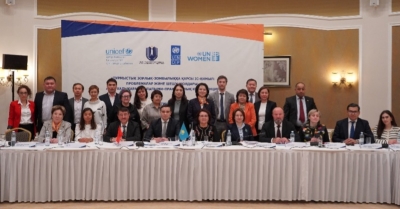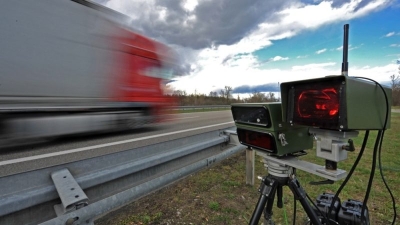The Brief — The Putin opposition paradox

Many in the West see Alexei Navalny, the Russian chief opposition leader, and Ukrainians as natural allies in the fight against Vladimir Putin. But opposition doesn’t always equal opposition.
The documentary film about the poisoning that nearly killed Navalny and his detention upon his 2021 return to Moscow won the Oscar for best documentary feature on Sunday.
Not surprisingly, the triumph of ‘Navalny’ was entirely ignored by the Russian state media and dismissed by a Kremlin spokesman as “Hollywood’s politicisation”.
Navalny, 46, the highest profile of the few remaining opposition voices in Russia, is serving his sentence in a maximum security penal colony in Russia.
Navalny’s wife, Yulia Navalnaya, took to the stage in Hollywood to accept the award on her husband’s behalf, praising him for “defending democracy” and voicing hope that Russia, and her husband, would one day be free.
Some Ukrainians were not too thrilled about her speech, though.
Noticeably missing from Navalnaya’s speech was any reference to or distancing from Russia’s invasion of Ukraine in 2014 and launching an all-out war in February 2022.
Many saw in it the continuation of the narrative that the war Russia is waging is Putin’s war and his war only.
Contrary to the dismay, the real problem is not that a documentary about Navalny won an Oscar – it’s about the stance of the Russian opposition in general, which in the eyes of many, has not taken any steps to rethink its approach to Russia’s imperialist narrative in historical and current relations with its neighbours.
While many rightly laud Navalny for his fight against corruption In Russia and his opposition to President Vladimir Putin, they, however, also highlight some of the questionable statements he has made in the past – especially about Russia’s foreign policy in neighbouring countries – which align quite well with the Russian nationalism.
It remains to be seen what happens after his release and what kind of Russian democratic opposition he will build.
Beyond Navalny himself, this exposes a bigger underlying issue Western observers often tend to overlook: Just because you’re an opponent to Putin (or any other autocrat, for that matter), it doesn’t necessarily make you a champion of democracy in the Western sense.
This makes the West face a fundamental problem: Not all opposition forces are equal to each other.
Just because certain opposition forces oppose Putin, it does not mean they can be seen as future guarantors of peace (Russia) or able to cooperate well with Ukraine (Belarus).
Kyiv’s mistrust of the Russian opposition forces runs too deep to enable real cooperation. Ukraine relies on its own fighting spirit and Western support, and very few Ukrainian policymakers believe the Russian aggression can be stopped by anti-Putin activism.
Ukraine also remains sceptical towards Belarus’ exiled opposition, though on a smaller scale and for different reasons.
Yes, there will be no secure Ukraine without a free Belarus, as Belarussian opposition leader Sviatlana Tsikhanouskaya keeps repeating.
But relations, nevertheless, remain rather limited.
Kyiv is upset that the exiled Belarusian opposition remains unable to mobilise its country’s society to overthrow strongman leader Alexander Lukashenko, who has been helping Putin’s war in Ukraine. Ukrainian government advisers don’t hide their scepticism about the effectiveness of the Belarusian opposition movement.
Meanwhile, exiled Belarussian opposition leaders cannot understand the Ukrainian government’s unwillingness to fully break with Lukashenko, rooted in Kyiv’s fear that it could make him actually join Putin’s war efforts.
The Roundup
Since Russia invaded Ukraine last February, thousands of Ukrainian children in foster care have been forcibly transferred to occupied territories or to Russia itself, according to Human Rights Watch (HRW).
Avian influenza outbreaks will increase in the poultry sector along with occasional infections in mammals, but this poses minimal risk for humans, concludes a new report by scientific EU agencies.
With only a few weeks before unveiling the EU’s revamped framework for pharmaceuticals, Health Commissioner Stella Kyriakides described the main drivers of the much-awaited reform, stressing the importance of finding the balance between patients’ and industry’s interests.
The European Parliament approved its stance on the Energy Performance of Buildings Directive (EPBD) on Tuesday (14 March), setting out a more ambitious position ahead of negotiations with EU countries.
Ahead of the Commission’s proposal for an EU soil health law expected in June, a coalition of NGOs, progressive farming organisations, and food businesses has called for ambitious and binding measures.
Don’t forget to check out our Transport Brief: Dissatisfaction with EU combustion law spreads for a roundup of weekly news on mobility across Europe.
Look out for…
- European Commission President Ursula von der Leyen participates in EP plenary debate in preparation for European Council meeting of 23-24 March 2023.
- Commission Vice-President Margaritis Schinas receives President of Castille and Léon Alfonso Fernandez Manueco.
- Commission Vice-President Vĕra Jourová meets via video conference with President of the European Investment Bank Werner Hoyer.
- Economy Commissioner Paolo Gentiloni meets with European Trade Union Confederation (ETUC).



